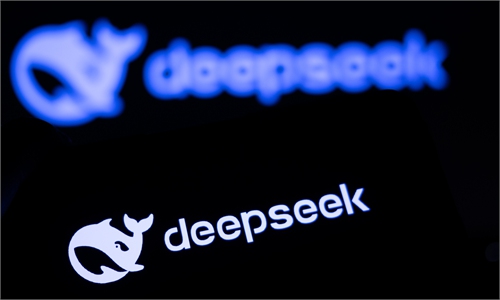
Photo: VCG
Editor's Note:With the emergence of the Chinese AI start-up DeepSeek, heated discussions have been triggered across the world. Some European experts believe that this is good news for Europe, as the experience of DeepSeek provides a reference point for developing advanced AI models with limited computing power and low cost. The Global Times invited scholars from both China and Europe to shed light on this.
Lü Benfu, a professor at the University of Chinese Academy of Sciences and Vice President of the China National Institute for Innovation and Development Strategy
What does DeepSeek bring to the table? Why did several large AI models emerge in China without causing much of a stir internationally, while DeepSeek has made a splash?
First, DeepSeek requires less computational power than ChatGPT to achieve the same outcomes. This is primarily where it is superior to US products. In terms of computing power, the US government has attempted to establish an encirclement to restrict China in recent years, involving various components from chips to the semiconductor industry. However, the emergence of DeepSeek has unnerved the US.
Second, another shock brought by DeepSeek is open-source. This means that Chinese AI companies have the confidence to publish large models. This shift could potentially reshape the future trajectory and standards of AI globally. As a result, in the future, Open AI might be forced to consider a partially open-source model.
Following this logic, in the future, some AI R&D institutions in Europe as well as countries and regions such as India, Japan and the Middle East may use DeepSeek as a basis when catching up with the development of large AI models.
Another key driver of the rapid AI development in the US and China is the accumulation of talent. Europe's stringent AI regulations have driven many AI experts to seek opportunities in the US and elsewhere. Furthermore, the European economy's slowdown in recent years has made it harder for AI startups to secure funding. Although Europe hasn't been devoid of innovation in recent years, its progress has been comparatively slower than that of the US and China.
Regarding China-Europe collaboration in the field of AI, I believe there's room for improvement in the following areas: First, China and Europe can expand their cooperation in chip manufacturing. For example, ASML, the leading Dutch manufacturer of lithography equipment, is the giant of chip production, however, affected by the US strategy to contain China's chip development, ASML has adopted some restrictive measures on equipment exports to China. If some European companies can resist Washington's efforts to exert unilateral pressure, there's tremendous potential for China-Europe cooperation in this field.
Second, China and Europe both boast substantial markets, creating enormous potential for collaborative development. It's no secret that many Chinese tech companies have prioritized the European market when expanding globally. China's vast market has consistently welcomed European companies, fostering mutual benefit and win-win scenarios.
Third, China and Europe can establish cooperative schemes or mechanisms for AI development through dialogue and negotiation, including technological collaboration. By leveraging their respective strengths in talent and technology, this tacit cooperation could potentially yield significant breakthroughs.
Jorge I. Aguadero Casado, a Spanish writer
Suddenly China's DeepSeek has raised its hand, changing the rules of the game. In Europe we consider it very possible that, largely due to chip restrictions imposed by the US, China has perfected a pre-existing technology, ARM technology (a set of instructions that can be used for the chip), to develop its own graphics cards. This technology is interesting because it is very energy efficient.
A Scandinavian academic specializing in computer science has conducted small experiments comparing both Chinese and American models. He told me that the great advantage that stands out in DeepSeek is its energy savings.
"How big is the technological leap made by DeepSeek?" I asked. "Chinese technology will easily improve, but how to save energy is not something that Americans have focused much on, it is going to cost them more." From his point of view, given the challenges that both technologies must overcome, the energy advantage that China has achieved seems much more important.
Regarding the agreements that US President Donald Trump has signed to invest $500 billion in a super-powerful American AI, I doubt that this can be carried out. Knowing that all models developed in the US are products of private companies, how would he use the money? At these levels, the gain in development time is not directly proportional to the economic effort. And I'm not sure the US government has that money to spend either, especially when news comes of the first wave of mass layoffs of federal employees. What could that money be put into, if it were real? In infrastructure, servers, computing... (I don't count the salaries of the researchers). "I think that DeepSeek, by investing much less money, can achieve the same," the Scandinavian academic told me.
Meanwhile, the EU is also showing notable activity. The academic's view in this regard is that Europe has a more regulatory thinking and that it also invests a lot in other areas of science. However, it has to face certain difficulties in terms of financing.
Wang Jianbin, a professor at the Academy of Regional and Global Governance at Beijing Foreign Studies University
In January this year, a relatively unknown Chinese AI company released its groundbreaking new model, DeepSeek-R1. With its low training costs and open-source model, it shook the AI industry. The emergence of this phenomenal AI product naturally became the focus of European media.
In early February, a notable report titled "Why we still underestimate China" was published by German media Die Zeit. What set this article apart was that it did not delve into the exceptional features of the DeepSeek-R1 model but instead focused on the question: "Why are we so surprised?" It further posed the soul-searching question, "Should we reexamine our perspective on China?"
As for why China frequently surprises the West, the German media summarized several reasons. First, the Chinese government vigorously promotes technological progress, viewing science and technology as productive forces. Second, the Chinese public is highly receptive to new technologies and innovations. Third, China's vast domestic market provides numerous application scenarios and guarantees scale effects. Fourth, China's large-scale talent cultivation in STEM (science, technology, engineering and mathematics) fields supports technological progress. "China graduates over 70,000 STEM PhD students annually," approximately twice as many as the US.
Over the past few years, I have frequently visited Germany for research and exchanges, and one deep impression I have is that, within the context of the EU's "a partner for cooperation, an economic competitor and a systemic rival" categorization of China, some short-sighted German politicians have been reinforcing the concept that China is a systemic rival of the West. Some German media's misrepresentation of China has further solidified this negative perception. However, the truth is the truth. Many of my German friends, after visiting China, have come away with a very different impression from the one conveyed by the Western media.
It is important to encourage more exchanges between the Chinese and German peoples to deepen mutual understanding and correct misperceptions. Both China and Germany should transcend differences in social systems, ideologies and stages of development, and approach mutual exchanges with the vision of finding a future development path for the world.


